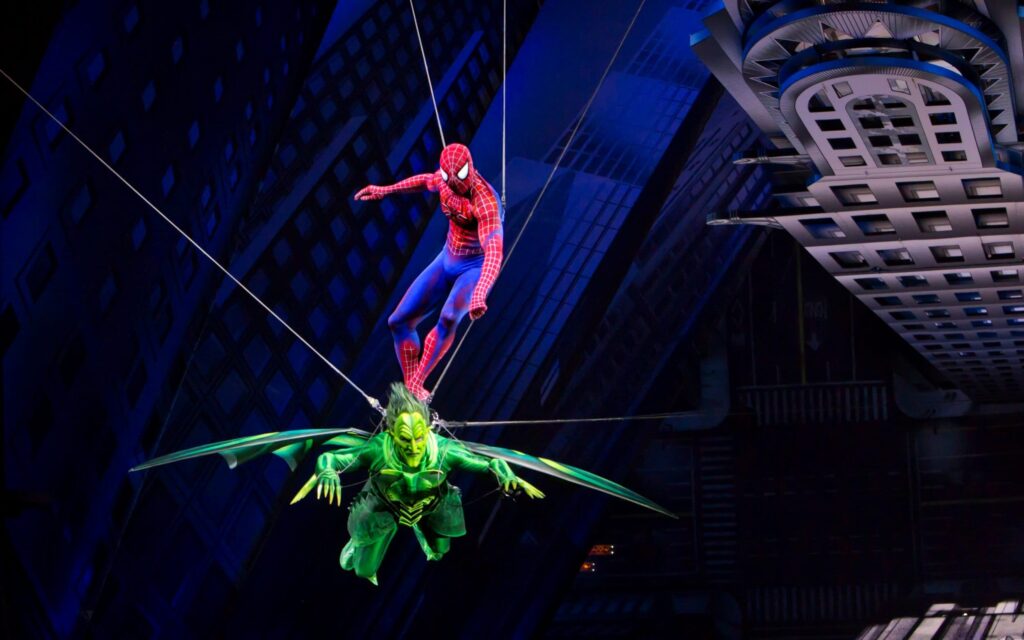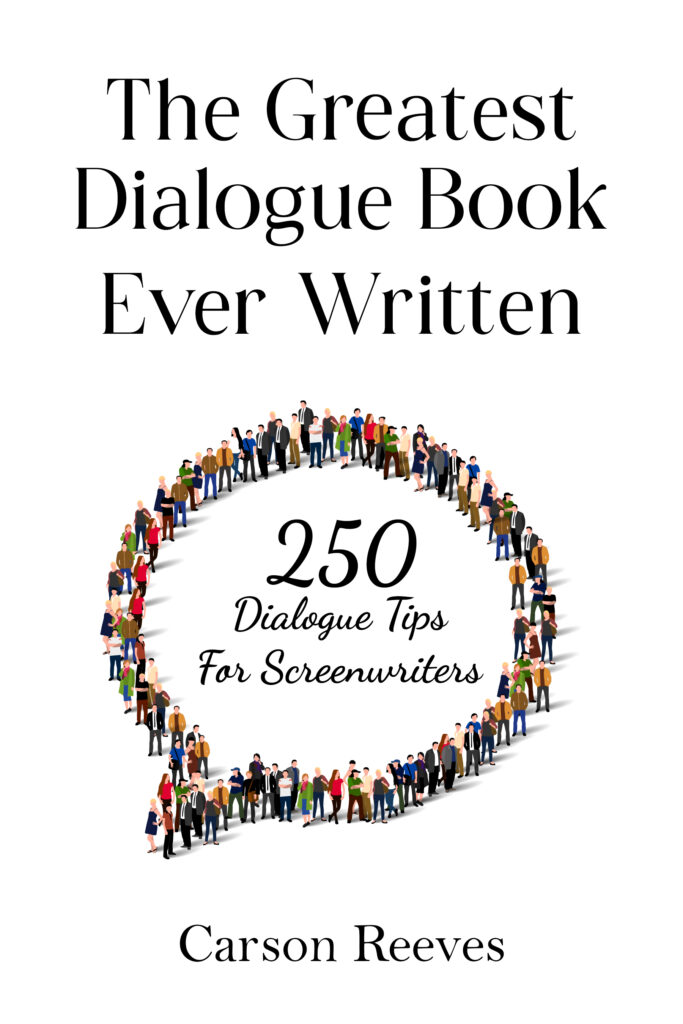More dialogue tips in today’s review!
Genre: True Story
Premise: The true story of the most insane Broadway production of the modern era, where visionary director Julie Taymor attempted to make a Spider-Man musical and had everything go wrong in the process.
About: This script finished on last year’s Black List. It’s written by Hunter Toro, who wrote on Pete Davidson’s show, Bupkis.
Writer: Hunter Toro
Details: 107 pages

Although I’ll probably never do it, I’ve always wanted to write a musical about tennis. I think it would be funny to have this big Broadway singing-dancing play that revolved around tennis balls flying everywhere and people wearing Wes Anderson-inspired Lacoste bodywear singing about double-faults and drop shots.
But that’s the extent to which I’m interested in anything that has to do with Broadway. It’s not my jam. It’s not my jelly. It’s not even my almond peanut butter. Which is why even the craziest story to come out of Broadway in decades – this one – never landed on my radar. I heard about it peripherally. But I didn’t care.
Then a few people told me, “No, Carson, this story is ABSOLUTELY NUTS. It’s worth checking out.” Normally, I don’t like real-life stories. But if you throw a doozy my way, I’ll give it a go.
Glen is a PBS writer for a children’s show when he gets the call every writer dreams of. Julie Taymor, the creator of the Broadway sensation, “The Lion King,” is putting together a musical about Spider-Man, and none of the previous writers worked out. Mainly cause they couldn’t deal with the insanity that is Julie Taymor.
Glen goes in for the interview where he not only learns that Julie is directing, but that freaking U2 is doing the music. As far as New York Broadway musicals go, this is the top of the top. It’d be like Christopher Nolan calling you tomorrow and asking you to write him a sequel to Memento.
But Glen instantly learns that Julie has… shall we say STRANGE ideas for a Spider-Man story. She’s never read the comics. Never saw the movies. And that’s the way she likes it. She wants to bring something completely original to the IP. And believe me, this is IP. There are many meetings with Marvel over the course of the story about what you can and cannot do with Spider-Man throughout the script.
The biggest thing Julie wants to do is, instead of using the endless number of comics to find a villain for the story, she wants to create her own: a Greek Goddess with spider-like powers. Actually, that’s not everything. She also wants to make Spider-Man sexy and dangerous. She envisions the Jacob Elordi version of Spider-Man. And it freaks Marvel the heck out. Julie likes that. Julie likes that a lot.
What happens next is insane. Julie wants the aerial spider battles to happen above the audience’s heads, which is basically impossible. We see how impossible when Stunt Spider-Man Actor falls 60 feet and becomes semi-paralyzed. Then U2 goes on tour and decides to not work on the musical at all. Bono’s never even watched a musical and hates all the music in them. And then you have poor Glen who has to leave his wife and kids to be next to Julie 24/7 so that he can always be nearby when she has an idea.
The Marvel company does everything in their power to convince Julie to make Spider-Man less sexy and to get rid of the terrible villain that makes no sense within the mythology of Spider-Man. But Julie does as Julie wants. And even when their producer dies of a stroke, Julie demands that Glen come over and write new pages on the day of his funeral.
When it’s all said and done, the production costs 65 million dollars. But it becomes a semi-must-see musical due to all the press calling it the biggest disaster in Broadway history. It’s somehow enough to give the play 3 years. But, in the end, it would lose over 75 million dollars and tarnish the legacies of everyone who worked on it.
 Reeve Carney, who played Spider-Man, just oozing innocence here.
Reeve Carney, who played Spider-Man, just oozing innocence here.
As I pointed out yesterday, in the coming weeks, with every script I review, I’m going to be focusing on dialogue. I just wrote a book about dialogue so I want to talk about this stuff while it’s fresh on my mind.
Today, we’re going to cover Tip 105 in the book:
Use dialogue to reveal character – What a person says tells us a lot about who they are. So, when applicable, try and write dialogue that reveals something about your character.
Too many writers use dialogue as a means to move the plot (or scene) forward and nothing more. They’re not taking advantage of the fact that every time a character opens their mouth, it’s an opportunity to tell us who they are.
Why is this important? Because a common weakness in screenplays is characters who we have no feel for. We don’t understand them. What is their defining characteristic? What is their worldview? We can never truly understand a person unless we know these things. So, here’s a scene on page 23 of today’s script where Julie explains to Glen why she chose him to write her play.

How do we know that the writer has revealed character in this scene? Because we know more about Julie after it! We know that she’s a risk-taker. We know that she fears nothing. We know that she pushes the envelope and is willing to fall on her face and we know that she expects the same from others in her orbit. That’s HUGE information about the character and we learn it within a single page.
You’ll also note within this scene that there’s another major dialogue tip covered in the book. Actually, it’s THE VERY FIRST TIP.
Create dialogue-friendly characters – Dialogue-friendly characters are characters who generally talk a lot. They are naturally funny or tend to say interesting things or have a unique perspective on the world, are quirky or strange or offbeat or manic or see the world differently than the average human being. The Joker in The Dark Knight is a dialogue-friendly character. Saul Goodman in Breaking Bad is a dialogue-friendly character. Deadpool is. Juno is. It’s hard to write good dialogue without characters who like to talk.
Julie Taymor is our dialogue-friendly character in this story. She’s weird. She’s unpredictable. She’s demanding. She says a lot of strange things. Dialogue cheers from the mountaintops when it finds out a character like this is in the script. Which is why you want to give your script the gift of dialogue-friendly characters as often as possible.
What about the rest of the script?
The great thing about crazy true stories is that they do a lot of the work for you. You don’t have to go looking for great scenes, like stuntmen falling 60 feet to their near-deaths. They come to you.
But I have found that, when you have a wild story and you have a wild character, like Julie, you must be cautious that your main character doesn’t disappear on the page. And that’s exactly what happens here. The Glen character gets swallowed up by all the craziness and leaves little to no impact, despite being the main character.
I’m not saying it’s easy to deal with this imbalance. But if you’re aware of it, you can take steps to offset it. You probably need to make your hero bigger than you originally planned. If all Glen is here to do is stare up at Julie in utter amazement, audiences aren’t going to play nice.
They want heroes that charge forward and have their own agency. At least at some point in the script. Glen has that moment but it’s so late in the story that it might as well be nonexistent.
As I said, I don’t like true stories. Yet if you’re going to write one, this is the exact type of story you want to re-tell. It’s big, it’s weird, it’s chaotic, and let’s be honest – it’s funny to watch something fail so spectacularly. For that reason, this is definitely worth the read. It’s too fascinating of a story not to be entertaining.
[ ] What the hell did I just read?
[ ] wasn’t for me
[xx] worth the read
[ ] impressive
[ ] genius
What I learned: When you’re creating your two main characters (the characters who are going to be in your script together the most), you have to imagine each of them on a scale. One on one side, the other on the other. On that scale, does one character clearly weigh down their side of the scale? If so, you’re going to need to add more to the other character. You have to make them more active, or talk more, or be funnier, or be tougher, or be smarter, or bring SOME WEIGHT to the table. Because if they’re getting overshadowed in EVERY SINGLE SCENE, readers will consider the character to be weak. And that’s what happened here. Glen comes off as a very weak character since he can never hang in any of the scenes he and Julie are in.

If today’s dialogue talk intrigued you, I have over (that’s right, OVER) 250 dialogue tips in my new book, “The Greatest Dialogue Book Ever Written.” You can head over to Amazon and buy the book, right now!

